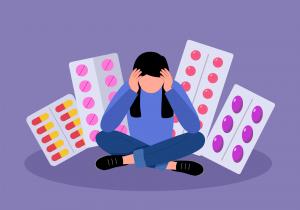— Dr. Arwen Podesta
NEW ORLEANS, LA, UNITED STATES, October 15, 2024 /EINPresswire.com/ — Addiction is a chronical, relapsing, treatable disease of the brain. It manifests and is sometimes seen as a behavioral issue, however, it is rooted in complex neurological processes that profoundly alter the brain’s functioning. Starting with the discovery of the brain’s reward pathway in the 1950’s, scientists have explored the intricate relationship between drug use and the brain, and it is now well understood how the brain’s reward circuitry and drug use and cravings interplay. This insight is critical to developing effective treatment strategies that address the biological underpinnings of addiction.
Dr. Arwen Podesta, owner of Podesta Wellness in New Orleans, Louisiana, emphasizes that addiction is a brain disorder with deep neurological implications. “Drug addiction alters brain pathways in a way that reshapes the brain’s reward system and decision-making processes,” she explains. These changes make it difficult for individuals to break free from the cycle of substance abuse, as the brain becomes increasingly dependent on the drug to maintain a sense of normalcy.
How Drugs Affect the Brain’s Reward System
One of the most significant ways that drugs alter the brain is by targeting its reward system, a network of neurons responsible for reinforcing behaviors that are beneficial for survival, such as eating and social interaction. This system is primarily driven by dopamine, a neurotransmitter that promotes feelings of pleasure and satisfaction.
When an individual uses drugs, this natural reward system becomes hijacked. Drugs like cocaine, heroin, and methamphetamine stimulate the release of large amounts of dopamine, creating an intense sense of euphoria. This surge in dopamine is far greater than what the brain would experience from natural rewards, which is why drugs can be so powerfully addictive. Over time, the brain adapts to these unnaturally high levels of dopamine by reducing the number of dopamine receptors or lowering dopamine production. This downregulation process, known as tolerance, leaves individuals feeling less pleasure
from the drug and also less pleasure from everyday activities, driving them to seek out the drug to achieve the same euphoric effect.
The disruption of the brain’s reward system, whether related to predisposing genetic factors or to environment or to drug exposer itself, is a central feature of addiction. As the individual continues using the drug, the brain becomes rewired to prioritize drug-seeking behavior, making it difficult to control impulses or make rational decisions. This phenomenon explains why people with addiction often struggle to stop using drugs despite knowing the negative consequences.
Long-Term Changes in Brain Pathways
The effects of drug addiction are not limited to the reward system. Prolonged drug use can cause structural and functional changes in other key areas of the brain, including the prefrontal cortex, the region responsible for decision-making, impulse control, and emotional regulation. Repeated drug-use, and also repeated use then withdrawal cycles, weakens the connections between neurons in the prefrontal cortex, impairing executive functioning, including impairing an individual’s ability to weigh the risks and benefits of their actions. This loss of control is a hallmark of addiction and contributes to the compulsive drug use seen in many individuals with substance use disorders.
Additionally, the brain’s stress and anxiety pathways are significantly affected by drug addiction. Chronic drug use can alter the brain’s stress response, making individuals more sensitive to stressors in their environment. This heightened stress sensitivity often leads to drug use as a coping mechanism, perpetuating the cycle of addiction.
Dr. Podesta notes that “the changes in the brain’s stress pathways are a major reason why addiction is such a chronic condition. Individuals with addiction often experience intense cravings and withdrawal symptoms when they attempt to stop using the drug, making it very difficult to achieve lasting recovery.”
Neuroplasticity and Addiction
One of the key insights into the neuroscience of addiction is the concept of neuroplasticity, the brain’s ability to change and adapt in response to experience. While neuroplasticity allows the brain to develop and learn new skills, it also means that repeated drug use can engrain addictive behaviors into the brain’s circuitry. The longer an individual uses drugs, the more deeply these behaviors become wired into the brain, making recovery a complex and challenging process.
However, neuroplasticity also offers hope for those struggling with addiction. Just as the brain can adapt to drug use, it can also rewire itself during the recovery process. With the right treatment, individuals can form new, healthier connections in the brain that support long-term sobriety. This is why many treatment programs focus on behavioral therapies that encourage positive habits and coping mechanisms to replace drug-seeking behaviors. Using precise individualized treatment plans, Dr. Podesta creates treatment plans for her patients in which she recommends additional tools to enhance neuroplascticity, such as certain micronutrients, hyperbaric oxygen, techniques and more.
The Role of Genetics in Addiction
While the environment plays a critical role in the development of addiction, genetic factors also contribute to an individual’s susceptibility to substance use disorders. Studies have shown that genetic variations can influence how a person’s brain responds to drugs, with some individuals being more prone to addiction due to inherited traits. For example, genetic differences in the dopamine system may affect how intensely a person experiences pleasure from drug use, which can increase the risk of addiction.
Moreover, genetics can also play a role in how quickly an individual develops tolerance and dependence on a drug. Those with a family history of addiction may have a higher likelihood of developing substance use disorders themselves. This understanding of the genetic basis of addiction underscores the importance of personalized treatment approaches that consider an individual’s genetic background.
Treatment Implications: A Holistic Approach
The growing understanding of how drugs alter brain pathways has profound implications for treatment. Addiction is not a moral failing or a lack of willpower, but rather a chronic brain disease that requires comprehensive medical and psychological care. Treatment programs that address the neurological aspects of addiction, including therapies that target the brain’s reward and decision-making systems, are essential for long-term recovery.
Medications that regulate neurotransmitter levels can be used to help restore balance to the brain and reduce cravings, while behavioral therapies can support the brain’s neuroplasticity, helping individuals develop new ways of thinking and coping. Effective treatment requires a multifaceted approach that addresses the biological, psychological, and social factors contributing to addiction.
Dr. Podesta’s practice at Podesta Wellness in New Orleans emphasizes the importance of treating addiction from a neuroscientific perspective. By addressing the underlying changes in brain pathways, treatment programs can offer individuals the tools they need to manage cravings, reduce the risk of relapse, and rebuild a healthy, fulfilling life.
Conclusion
The neuroscience of drug addiction reveals that substance use disorders are deeply rooted in the brain’s pathways, affecting both the reward system and key areas involved in decision-making and stress management. Understanding these neurological changes is critical for developing effective treatment strategies that can help individuals break free from the cycle of addiction. As the field of neuroscience continues to evolve, new insights into brain function will play a crucial role in shaping the future of addiction treatment.
Morgan Thomas
Rhino Digital, LLC
+1 504-875-5036
email us here
Visit us on social media:
Facebook
Legal Disclaimer:
EIN Presswire provides this news content “as is” without warranty of any kind. We do not accept any responsibility or liability
for the accuracy, content, images, videos, licenses, completeness, legality, or reliability of the information contained in this
article. If you have any complaints or copyright issues related to this article, kindly contact the author above.
![]()
Originally published at https://www.einpresswire.com/article/751996105/the-neuroscience-of-drug-addiction-how-drugs-alter-brain-pathways







